Indivisible Illinois State Call Hosted by Vote by Mail Taskforce March 2, 2022 with David Pepper
|
|
Archived page
The genesis of The Election Security Strategic Team (ESST) was created when it was discovered by 17 of our intelligence agencies that the United States elections had been interfered with in 2016. It was also discovered at that time that Illinois was 1 of 21 states that was hacked and the only state whose voter registration clearinghouse was breached.
Free and fair elections are a central pillar of our democracy. Voting is a fundamental right of all Americans. If people lose faith in the integrity of their vote, they may not exercise their right to cast a ballot. We formed our group to fight for and restore this sacred right.
Please join us. All Americans should be confident that their votes will be cast and correctly counted when they go to the polls. Together we can make a difference.
Contact: Rose Colacino, Election Integrity & Security;
Voters’ Rights Lead, Indivisible Illinois
Rose Colacino has been a member of Indivisible since 2016. She is the Election Security Lead for Indivisible IL and earlier this year organized and participated in a nationwide rally that helped secure $250 million in election security funding prior to the 2020 election. Rose has also developed an Indivisible 2020 plan concentrating on the critical swing states of Wisconsin and Michigan with a focus on Wisconsin, working closely with Wisconsin Democrats and Swing Left WI. Rose has a B.A. in Political Science and an M.B.A with a concentration in Marketing
|
|
Indivisible Illinois joins AAUW Naperville, Chicago Women Take Action, IL NOW, League of Women Voters Illinois, LWV Chicago, LWV Naperville, LWV Southside, NAACP of DuPage County, National Association of University Women-Windy City Branch, NCJW Chicago North Shore, NCJW South Cook, Protest to the Polls, Rainbow PUSH Coalition, SEIU HealthcareIL/IN/MO/KS, She Votes IL, Women’s March Chicago, Women of the 7th Congressional District and others for a virtual town hall on Zoom.
Promoting Equity IL – Does My Vote Still Count?
Virtual Town Hall on Zoom
Monday, Nov. 29, 2021
7:00-8:30pm CT
“We are the people that we are waiting for, “says Rose Colacino, Indivisible Illinois co-coordinator and leader of the Indivisible Illinois Vote-by-Mail Taskforce. “It is the citizen movements that have moved us from protest to power. Our constitutional right to vote is in fact our superpower, and that right will not be denied. That’s what makes this Virtual Town Hall so important.”
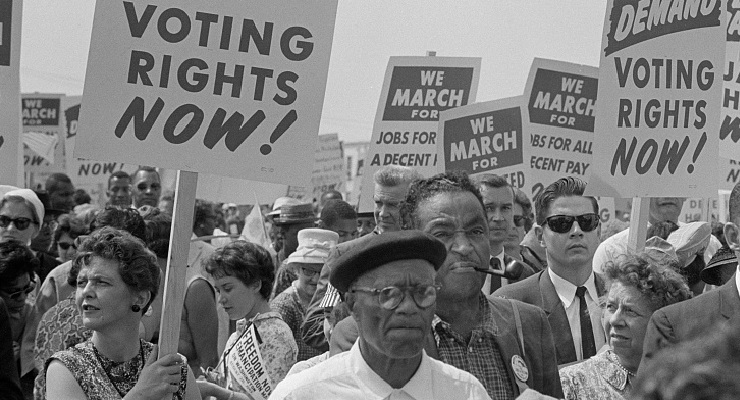
Webinar made available by DuPage County NAACP will also be streamed on Facebook live
What is the future of voting and democracy in the United States? Join us to better understand The Freedom to Vote Act and the John Lewis Voting Rights Advancement Act. What happens if they pass in Congress and what happens if they don’t? We will also explore how we can strengthen voting rights in Illinois to increase racial justice and ensure that we all have a voice. Q and A will follow as will Action items.

Dr. Barbara Arnwine, Esq., president & founder of the Transformative Justice Coalition, is internationally renowned for contributions on critical justice issues including the passage of the landmark Civil Rights Act of 1991 and the 2006 reauthorization of provisions of the Voting Rights Act. Currently, she also serves as Co-Chair and Facilitator of the National Commission for Voter Justice, the Millennial Votes Matters Convenings and the Voting Rights Alliance. As past Executive Director of the Lawyers Committee for Civil Rights Under the Law, she started the 1-800-Protect the Vote Hotline. She will discuss the current federal voting bills and what we can expect and do in terms of action, if they pass or if they don’t. She will also give us an update on the Ahmaud Arbery trial.

Jay Young, Executive Director of Common Cause, has long been involved in the redistricting process in Illinois, from comprehensive efforts to maximize Census 2020 participation in Illinois to repeated appearances before the House and Senate Redistricting Committees. He has had thousands of actions taken by our supporters across the state to advance the cause of a fair process and a fair map. He will share his insights with us.

Frederique Desrosiers is currently the Policy Organizer at Chicago Votes, a non-partisan, non-profit organization building a more inclusive democracy and empowering those whose voices are routinely overlooked. At Chicago Votes, she lobbies for their legislative interests and advances policies that seek to bring equity into our democratic systems. She is also a first generation Haitian American. Frederique will discuss pressing local issues including the Voting in Prison initiative.

Ami Gandhi is Senior Counsel of Chicago Lawyers for Civil Rights. Her works reduces barriers to voting and improves civic participation, especially in communities of color and low-income communities. Ami’s experience includes leading statewide voter protection for the 2016 and 2020 elections, partnering with community members in the criminal legal system to expand voter access, advocating for communities of color during Illinois redistricting, and advising local election authorities as they implemented the first Hindi ballots in the country. She will discuss racial equity issues with voting.

Lance Gough, Moderator. Mr. Gough former Executive Dir. of the Chicago Board of Elections, a role in which he served for over 30 years. Throughout his tenure as Executive Director, Gough was responsible for managing voter registration and election administration for over 1.5 million voters. He managed unprecedented changes in election administration including the transition from punch cards to optical scanners and touch screens; the introduction of electronic poll books; expanded registration with online and election-day programs; and the launch of in-person early voting, no-excuse Vote By Mail and Secured Drop Boxes. Through his retirement, he continues to work with the Board in an advisory capacity.
Zoom RSVP Link: https://us06web.zoom.us/meeting/register/tZMvd–hpzIoH9Yb78PwCbX8fvJC91ng3F8k

FOR IMMEDIATE RELEASE
Contact: Rose Colacino, State Co-coordinator
[email protected], 773-343-9849
While voter suppression bills abound in other parts of the country, the General Assembly expands the right to vote across Illinois
CHICAGO, Illinois (June, 2, 2021) – Indivisible Illinois is proud to announce that, thanks to over a year of Indivisible’s hard lobbying with state legislators in Springfield, several of its top priorities for voting reform have just been passed by the Illinois General Assembly.
Indivisible Illinois has been working on voter security, voting rights, and voter reform since 2016, when it was discovered that Illinois’ voter registration clearinghouse had been hacked. By 2019, they were in the forefront of pushing for robust ballot audits. In 2020, it began its push for vote-by-mail, drop boxes, curbside voting, and other similar measures.
“We’ve worked long and hard on getting some of these reforms passed,” says Rosemarie Colacino, Indivisible Illinois’ lead since 2018 on voting rights and voter security. “To see them pass the General Assembly yesterday was just incredible. It’s a win for every voter in Illinois.”
Among other measures, SB825, if signed by Gov. Pritzker, creates a permanent vote-by-mail list (no more asking for a ballot every election), and permanently authorizes ballot drop boxes and curbside voting. It also provides for polling stations at certain jails, a measure for which Indivisible Chicago-South Side had been fighting for several years.
“All the hours of work put in by our volunteers, all the constant emails with legislators, particularly State Sen. Julie Morrison—it’s all been worth it to make voting safer and more secure and easier for every voter,” says Colacino.
Indivisible Illinois is part of the locally-led, people-powered Indivisible Project network, a grassroots American movement founded in 2016, with thousands of chapters in urban, suburban and rural areas, with at least two groups in every congressional district. Indivisible Illinois engages and empowers people in the Land of Lincoln, the Home of Obama, the Heart of the Midwest, to promote a progressive agenda, elect progressive leaders and realize progressive government.
###
By Terry Maher
Champaign-Urbana Chapter of Bend the Arc Jewish Action
It’s not just potential problems with the Post Office that might affect the success of Vote by Mail. According to an investigation by The Guardian newspaper, voters have found out after the fact that valid mail-in ballots were rejected because of a supposed discrepancy in the voter’s signature. As The Guardian put it, it’s “a decision that can be left to the whims of election officials with little guidance.”
Then there are the ballots that are requested but never received, not to mention the ballots that are submitted by mail in plenty of time but supposedly arrive after the election. A further wrinkle: some ballots arrive without postmarks because of the way the post office treats different kinds of mail, leading some election officials thinking they can’t legally count them.
States across the country rejected thousands of main-in ballots for these and other reasons during recent elections, but The Guardian has found evidence that first-time, young, and minority voters may be more likely to have their ballots rejected than other voters. In Florida’s 2018 election, first-time voters accounted for 5% of all vote by mail ballots cast in the state, but represented 12.7% of the ballots that went uncounted. In the state’s March primary, minority voters were twice as likely to have their ballots rejected than their white counterparts, according to the Stanford-MIT Healthy Elections Project. The result? Behind-the-scenes voter suppression.
One important solution: push for ballots to be accepted if they are postmarked by the date of the election. Democrats have filed a slew of lawsuits demanding this. After all, if it’s good enough for the IRS, it should certainly be good enough for an election.
You can read The Guardian’s entire report at https://www.theguardian.com/us-news/2020/jul/08/mail-in-ballots-rejected-small-errors
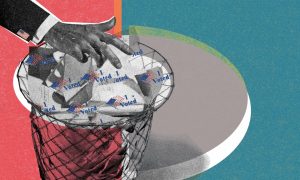
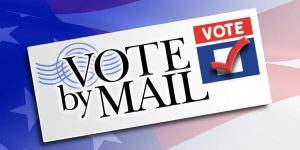
November is coming! It is important that we all make a plan to vote for this historic upcoming election and for all those that follow.
Here’s a Voters’ Calendar for what has become, in reality, “Voting Season.” This Voters’ Calendar will stretch our civic attention span to make high-turnout elections a task that mere mortals can perform, not a superhuman feat that tests the endurance of even the most dedicated voters.
Protection of your voting rights and planning for #VirusFreeVotingILLINOIS starts three months out for each election.
First, we must change our language from “November Election,” “Election Day,” and “November 3rd” to “the fall election,” and “the General Election.” We must stop conditioning one another to think there is one day only to exercise our voting rights especially given the current environment and the ongoing pandemic.
AUGUST (JUNE AND JULY for our timeline) is Check Your Registration month
JUNE – SEPTEMBER is Request Your Mail Ballot month. Official ballots can be mailed out to registered voters in Illinois starting on September 24, 2020.
OCTOBER is Vote Your Mail Ballot Month—or If You Want to Vote In Person, Keep it to Take With You Just in Case.
NOVEMBER is Last Chance Month: The Endgame. If you vote on Election Day, you know to expect a line. If you didn’t get a mail ballot that you had requested, check your local rules to know what to expect in person.
TOOL TO HELP YOU DECIDE WHO TO VOTE FOR: https://ballotpedia.org/Sample_Ballot_Lookup
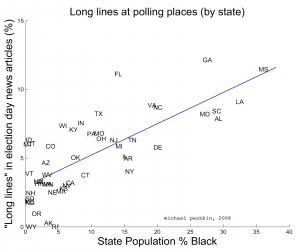
By Michael Peshkin, March 5, 2020
Oh, so who did you suppose was standing in those long polling place lines? I made this graph on November 5, 2008, based on how many local and regional newspaper articles commented on the long lines. Don’t blame it on a big Obama bump in 2008, that’s a myth (small bump). And sure, I’d rather have had actual wait-time data for each polling place, to correlate with local census demographics, but that data is not collected.
There’s an optical illusion at play here. You seldom see anyone leave a line, and I’ve had campaign organizers who ought to know better tell me that a line is more of an inconvenience than an actual factor in outcomes. There is solid research on that, however. Polling place lines typically deter about 4% of would-be voters from getting in the line. If lines occur selectively by race or political geography, lines can be effective for partisan advantage.
From an Election Security perspective, what should we expect in 2020? Let’s compare two kinds of foreign interference: hacking of actual vote counts, vs. hacking of registration systems and election infrastructure to create chaos and lines. If you hack votes, you may get away with it and affect an outcome, or you may be detected (you may even want to be detected) and create societal havoc. The loser will claim a stolen election and the winner will claim fake news. The courts might or might not order a new election.
If you hack voting infrastructure and create lines selectively in the areas where one candidate’s strength is, you can also affect the outcome (4% is a big effect, and it could be done much bigger than that.) You will surely be detected. But unlike a hacked tally, there is no re-do for an election that goes technically haywire. You irreversibly win the election and you create the societal discord too, which is a purpose in itself, perhaps the primary purpose.
What might help? Cybersecurity, of course. Holding elections for a month (essentially, month-long early voting and no election day). Or greater use of vote-by-mail, even entirely vote-by-mail as is done now in several states. These would avoid the “zero-day” attack scenarios I outlined. They could also reduce an age-old tradition of Black vote suppression.
Election Security advocates tend to be wary, especially of vote-by-mail. Their concerns are valid, too. Let’s ponder the alternatives.
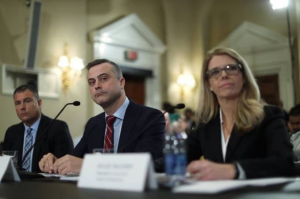
Election Systems & Software CEO Tom Burt, CEO of Dominion Voting Systems CEO John Poulos and Hart InterCivic CEO Julie Mathis testify before the House Administration Committee. (Photo by Alex Wong/Getty Images)
Cybersecurity experts have told us that the gold standard for fair and secure elections are hand-marked paper ballots and robust post-election audits. However, the current trend is to vote on computers. The question is, how safe are the voting systems that you rely on today to secure your vote?
Here is what an expert, formerly with election systems vendor Hart InterCivic, tells us: “It’s very simple. No matter how secure that device is, there’s no way to know whether the choice that’s recorded matches what the voter intended. It’s rightly called a black box,” Edward Perez, a former Hart InterCivic executive who is now global director of technology development at OSET Institute, a nonprofit election technology organization, said in an interview.
Government agencies tell us that Russian hackers probed election systems across the country in 2016 and penetrated systems in our own state of Illinois as well as in Florida.
So why are states, including Illinois, paying exorbitant tax payer funds to purchase the new wave of machinery, called Ballot Marking Devices (BMDs)? BMDs are an increasingly popular piece of equipment that combines paper and touch-screen voting estimated to cost anywhere from $3,000 – $5,000? They are systems that are known to be unstable AND tend to cause long lines at polling places as reported by cybersecurity experts such as Drs. Richard DeMillo of GIT and Phillip Stark of Berkeley. Illinois purchased BMDs for $31 million in September of 2018 for Suburban Cook County. We understand that the Chicago Board of Elections has signed up for BMDs as well. Currently, there are more than 350,000 voting machines in use across the nation. This makes no sense given that most experts agree that hand-marked paper ballots are more reliable and cost effective. Assistive devices should only be available for people with disabilities.
Earlier this month, the three major CEOs of election systems testified at a three-hour congressional hearing for the first time to explore what’s being done to secure the vote before one of the more contentious general elections in decades.
As my group, Election Security Strategic Team (ESST), has demonstrated through an election security public awareness campaign, more than 90% of United States voting machines are made and controlled by just three vendors: These vendors are Elections Systems & Software (ES&S), LLC, Dominion Voting and Hart InterCivic. ES&S and Dominion account for 80% of the market. Illinois Suburban Cook County has purchased BMDs in the Dominion family of products. The control of our voting processes by these vendors opens the door to vulnerabilities.
Background on the vendors:
• As cited by the articles referenced and reviewed here, these vendors supply three main types of equipment that voters use at the polls: 1) optical or digital scanners for counting hand-marked paper ballots, 2) direct record electronic called DREs (usually touchscreen) voting machines, and 3) BMDs that generate computer-marked paper ballots or “summary cards” to be counted on scanners often with much-disputed barcodes used to assess your vote
• Despite three years of congressional attention to election security since Russia’s hacking efforts in 2016, little has been done to oversee the voting machine vendors who run our elections. Mitch McConnell has put the kibosh on a plethora of legislation introduced in Congress and designed to protect our elections, which has actually been bipartisan in some cases
• Is lobbying by the vendors why we have these machines? Philadelphia City Controller Rebecca Rhynhart said she found “serious flaws” with the way her city had awarded a $29 million contract to ES&S, following more than $425,000 in lobbying efforts and campaign contributions by the company as part of a six-year sales campaign. The company has defended its efforts, and argued its spending was properly documented. ES&S’s CEO, Tom Burt, told the panel that the company deployed lobbyists “to educate any of those involved about who we are as a company, the values we hold, and how we conduct our business.”
• Software from the vendors is considered proprietary. Therefore, if election officials want to investigate problems with software, they are legally unable to do so. This is not acceptable
• Privately held, private equity firms own each of the top three vendors. They have been unwilling to identify specific ownership which should cause major concern. We must demand answers
• This is a low-margin market, vendors are known to make contributions to political parties which put decision making about these systems in question. ES&S has donated more than $30,000 to the Republican State Leadership Council since 2013
• There is also a revolving door between election systems vendors and some election officials
Excerpts from the hearing:
• Vendors faced a range of questions on sensitive topics from lawmakers on their companies’ products and supply chains, their lobbying practices and the reliability and security of those trending BMDs
• The vendors declined to answer questions about their annual profits, stating: “We’re a private company, so we’ll keep that information private,” ES&S’s Burt said. This lack of transparency is unacceptable!
• The executives acknowledged that their machines include hardware manufactured in China, a state of affairs that has been identified as a potential security risk, but argued that that was an unavoidable outcome of 21st century global supply chains
• Liz Howard, counsel for the Brennan Center’s Democracy Program and a former deputy commissioner at Virginia’s Department of Elections, warned that election vendors “play a critical role in our democracy but have received little or no congressional oversight.”
• Matt Blaze, a Georgetown computer scientist and a prominent expert in the field, said that election infrastructure—not only used to cast votes, but to register voters, design ballots, and report results—“has proven dangerously vulnerable to tampering and attack,” and suggested policymakers should devote more attention to such backend systems, which can offer hackers more centralized targets
• Blaze said that machine-aided elections can be safe and reliable as long as voter intentions are accurately recorded on paper then checked in rigorous post-election audits. (Please note that I personally disagree that machines can reliably record voter intent as are Professors DeMillo and Stark.) Unfortunately, Blaze noted, only a handful, but growing, number of states employ what’s known as a risk-limiting audit, the gold standard among election security experts that harnesses statistics to randomly select ballots for manual inspection and comparison against the machine tallies.
• Just as we don’t expect the local sheriff to single-handedly defend against military ground invasions, we shouldn’t expect county election IT managers to defend against cyber attacks by foreign intelligence services,” Blaze said, “But that’s precisely what we’ve been asking them to do.”
Bottom line:
Matt Blaze: “The vulnerabilities are real, they’re serious, and absent a surprising breakthrough in my field—which I would welcome but I don’t see coming soon—probably inevitable.”
What can we do about it?
Plenty, knowledge is power. Let’s take what we have learned and schedule meetings with our state legislators and election officials to secure our votes. This is a critical area of our democracy that has received scant attention. Let them know that we the people are paying attention. Schedule an appoint today and ESST will join you to demand accountability and transparency in our elections.
Want to know what your county is using? Check this out!
CONTACT ROSE AT ESST TO DISCUSS HOW YOU CAN SECURE THE VOTE: [email protected]
Sources used for this posting:
Vicens, AJ, (January 10, 2020), Voting Machine Makers Face Tough Questions from Congress, Mother Jones, Voting Machine Makers Face Tough Questions from Congress
Popken, Ben, (January 9, 2020), Voting Machine Vendors Testify in Election Security Hearing, MSNBC Video, Voting machine vendors testify in election security hearing
Marks, Joseph, (January 10, 2020), The Cybersecurity 202: Voting Vendors, Security Pros Still Far Apart on Protecting 2020 Election, Washington Post, , The Cybersecurity 202: Voting vendors, security pros still far apart on protecting 2020 election
Cohn, Jennifer, (November 5, 2018), Voting Machines: What Could Possibly Go Wrong?, NYR Daily, Voting Machines: What Could Possibly Go Wrong?
Zetter, Kim, (October 30, 2018), Texas Voting Machines Have Been ‘a Known Problem’ for a Decade, VICE, Texas Voting Machines Have Been ‘a Known Problem” for a Decade
Lauterbach, Cole, (January 10, 2020), County Clerk from Illinois Testifies on Election Security, The Center Square, County clerk from Illinois testifies on election security before Congress
As we start the year and embark on winning back the presidency, the Senate and keeping the House we must in the name of election security also address and fight disinformation campaigns that are perpetuated against democratic candidates and those focused on suppressing the vote.
When the Election Security Strategic Team (ESST) attended a hearing conducted by the U.S. House Department of Homeland Security, the testimony of both Steven Sandvoss, Executive Director of the Illinois State Board of Elections (ISBE) and Matthew Masterson, Senior Cybersecurity Advisor of the Department of Homeland Security (DHS) relayed that they were concerned about not only the security of voting systems but also the proliferation of disinformation as an attempt to keep people away from the polls.
According to Mr. Masterson, DHS will be rolling out an anti-disinformation campaign prior to the 2020 elections. While we await the launch of that campaign, the Democratic National Committee (DNC) recently produced a document worth your time. If each of us as citizen activists take ownership for promoting and abiding by the recommendations in this document, we will be heading in the right direction. Document found here: https://democrats.org/who-we-are/what-we-do/disinfo/general-public/
Thanks to Scott Cross for calling the DNC Combating Online Disinformation document to our attention.
The document is comprehensive and thorough. I will concentrate on the section entitled, DNC Recommendations for Combating Online Disinformation – General Public.
Here are the key recommendations:
I want to add recommendations from George Lakoff Professor Emeritus, UC Berkeley:
Apply the Truth Sandwich-
Back to the DNC document which references the Senate Intelligence Committee report found below: https://www.intelligence.senate.gov/sites/default/files/documents/Report_Volume2.pdf.
As stated in that report, the Internet Research Agency (IRA) is an entity headquartered in St. Petersburg, Russia, which since at least 2013 has undertaken a variety of Russian active measures campaigns at the behest of the Kremlin.
It is my opinion that in order to combat the problem we must be fully aware of the measures that are being undertaken.
I highlight key findings below in the section, IRA Operations Explicitly Targeting the 2016 U.S. Election:
In addition to denigrating Hillary Clinton, voter suppression among left-leaning audiences appears to have been another political goal of the IRA’s influence operatives. Young Mie Kim, a digital advertisement research expert from the University of Wisconsin, has closely analyzed the IRA’s Facebook advertisements. On the basis of Kim’s analysis, three types of voter suppression campaigns on Facebook and Instagram emerge, including:
a) turnout suppression/election boycott;
b) third-candidate promotion; and
c) candidate attack, all targeting nonwhites or likely Clinton voters.”143
Kim found no evidence of a comparable voter suppression effort that targeted U.S. voters on the ideological right (page 35)
Side point from me about point (c) “likely Clinton voters” above. Jason Johnson in The Root reminds us that 53% of white women pushed Trump over the top in 2016. Something that as a white woman myself and a Hillary Clinton supporter that I will never understand. Perhaps some of the disinformation campaigns worked on them too.
I found these points from the Senate Intelligence report also worth calling to your attention:
In addition, the IRA “had a strategic goal to sow discord in the U.S. political system,” which included- but was not limited to-targeting the 2016 U.S. presidential election.156 John Kelly found that “[i]t’s a far more sophisticated attack than just caring about an election. And it’s not just one election they care about. They care about the electoral system.”157
Darren Linvill echoed this point, concluding “[I]n general, there’s been too much focus on Russian interference in the election. It’s much more than that. It’s interference in our society, in our culture, in our political conversation.”158 (page 37 – 38)
No single group of Americans was targeted by IRA information operatives more than African-Americans. By far, race and related issues were the preferred target of the information warfare campaign designed to divide the country in 2016. Evidence of the IRA’s overwhelming operational emphasis on race is evident in the IRA’s Facebook advertisement content (over 66 percent contained a term related to race ) and targeting (locational targeting was principally aimed at “African-Americans in key metropolitan areas with well-established black communities and flashpoints in the Black Lives Matter movement”), as well as its Facebook pages (one of the IRA’s top-performing pages, “Blacktivist,” generated 11.2 million engagements with Facebook users), its Instagram content (five of the top 10 Instagram accounts were focused on African-American issues and audiences), its Twitter content (heavily focused on hot-button issues with racial undertones such as the NFL kneeling protests), and its YouTube (page 38 – 39)
I include recommendations listed on page 78 of the report:
This challenge requires an integrated approach that brings together the public and private sectors. This approach must be rooted in protecting democratic values, including freedom of speech and the right to privacy. The Federal government, civil society, and the private sector, including social media and technology companies, each have an important role to play in deterring and defending against foreign influence operations that target the United States.
In closing it is my opinion that after being made aware and recognizing the strategies of Russian Active Measures and in order to adopt a comprehensive approach to resolve the problem, our best recourse is to turn the executive and Congressional branches blue. It is the only way, in my eyes, to enact legislation such as HR 1 and the numerous crucial election security bills that sit dormant on Mitch McConnell’s graveyard of stalled legislation.
We are in for the fight of our lives. Now, let’s get to work.
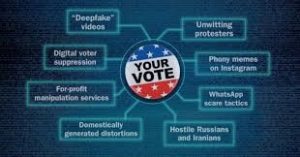
Indivisible Illinois
P.O. Box 11
Lombard, IL 60148
We come from different backgrounds and walks of life, we have different stories, but we are united in the belief that we can achieve more when we stand together. The name Indivisible is rooted in this idea – that our power lies in showing up together, the notion that if we stand together, we won’t fall.
